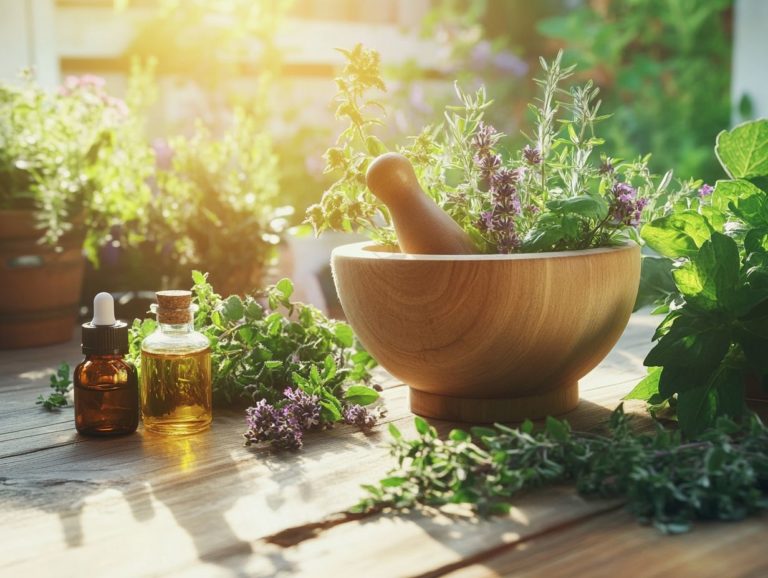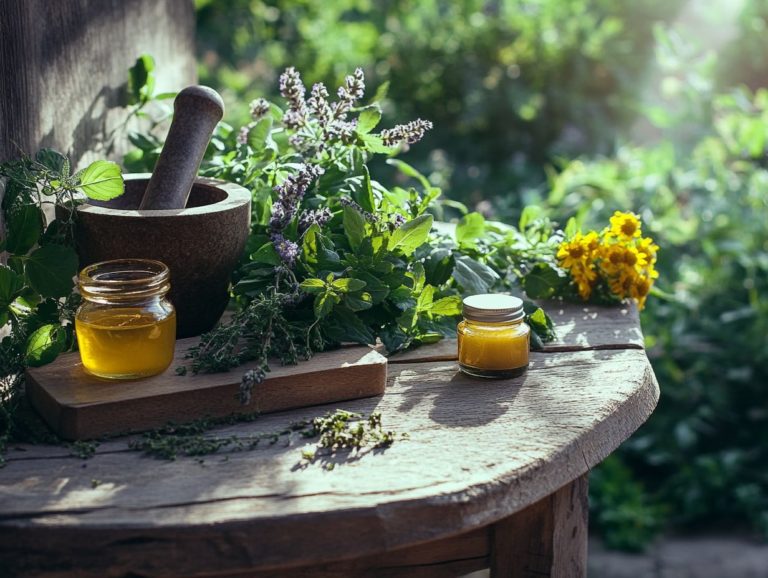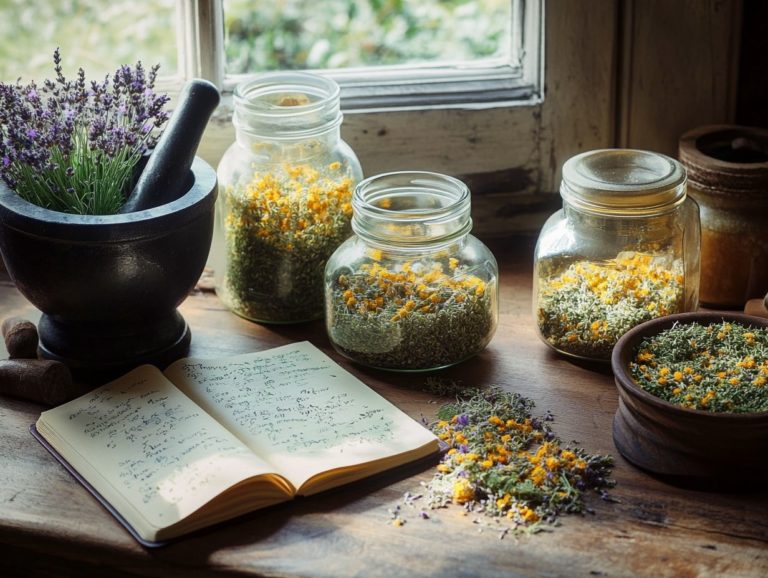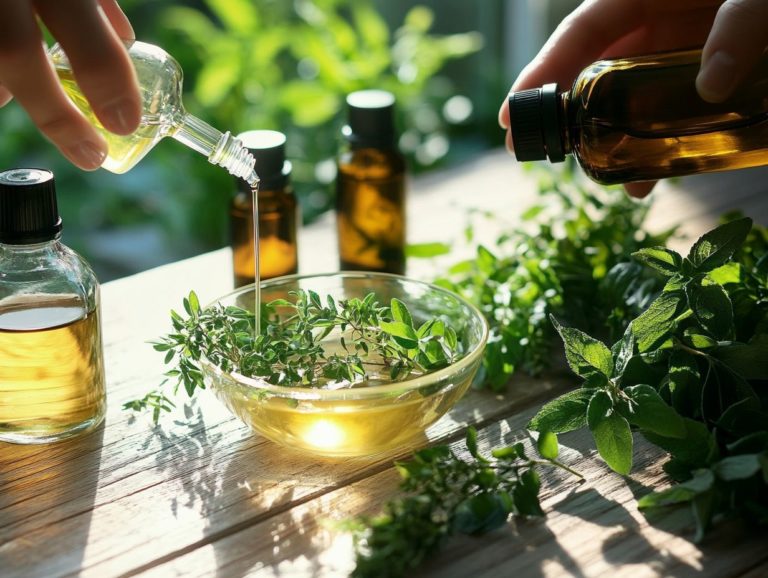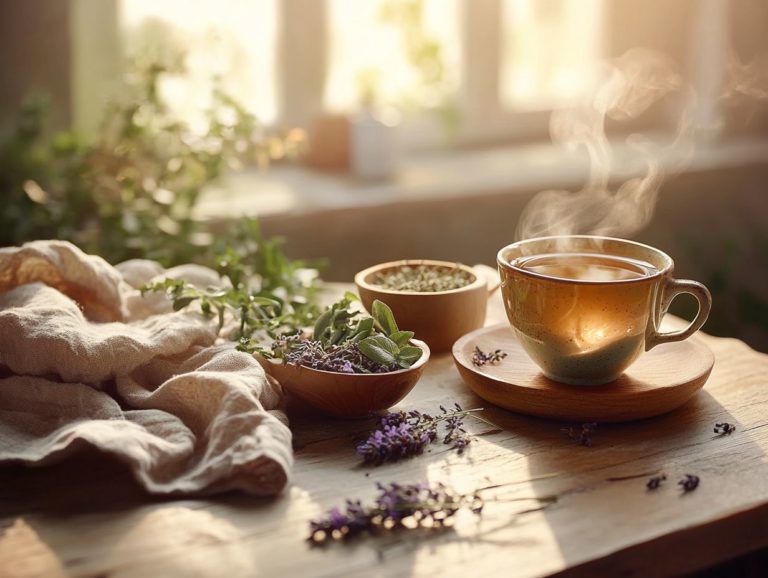Top 5 DIY Herbal Remedies for Stress Relief
In today s fast-paced world, stress has become an all-too-familiar companion for many. While conventional methods such as medication may offer some relief, you might find yourself seeking solace in the embrace of nature instead.
This article delves into five powerful herbal remedies lavender essential oil, chamomile tea, lemon balm, ashwagandha, and passionflower that can help soothe both your mind and body. These natural remedies also offer therapeutic benefits for anxiety treatment and stress management.
You will explore what stress truly means, how these remedies work, and practical tips for seamlessly incorporating them into your daily routine. We ll also address any potential risks involved.
Discover a more natural path to finding your calm with methods like deep breathing or guided meditation!
Contents
- Key Takeaways:
- 1. Lavender Essential Oil
- 2. Chamomile Tea
- 3. Lemon Balm
- 4. Ashwagandha
- 5. Passionflower
- What Is Stress and How Does It Affect the Body?
- How Can Herbal Remedies Help with Stress Relief?
- What Are the Different Types of Herbal Remedies for Stress Relief?
- How Can One Incorporate Herbal Remedies into Their Daily Routine?
- Are There Any Risks or Side Effects of Using Herbal Remedies for Stress Relief?
- What Are Some Other Natural Ways to Manage Stress?
- Frequently Asked Questions
- What are the top 5 DIY herbal remedies for stress relief?
- How does lavender help with stress relief?
- Can chamomile really help with stress relief?
- What is ashwagandha and how does it help with stress relief?
- How can lemon balm be used for stress relief?
- Is valerian root an effective DIY herbal remedy for stress relief?
Key Takeaways:
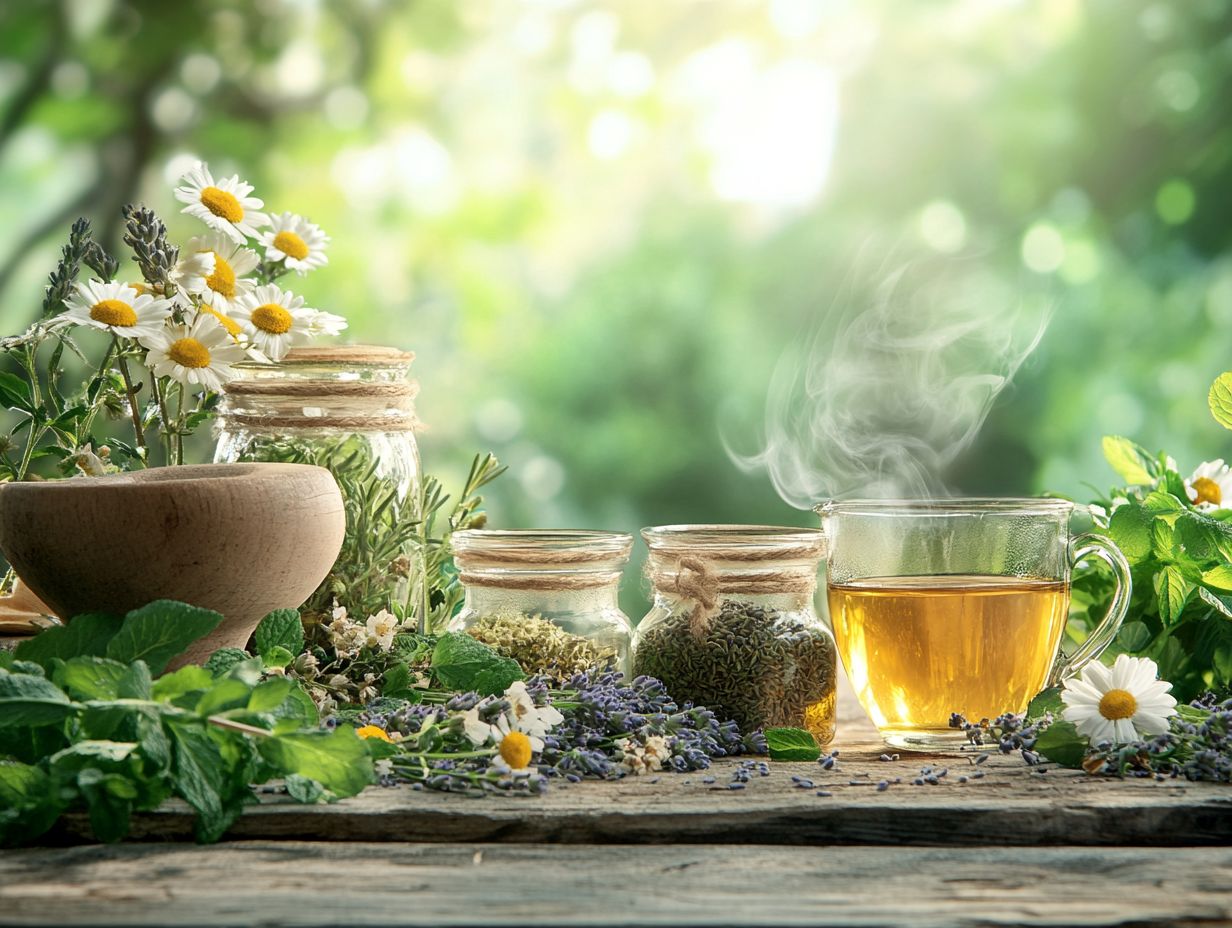
- Incorporating lavender essential oil into your daily routine can help reduce stress and promote relaxation.
- Drinking chamomile tea can provide calming effects and alleviate anxiety and stress. Remember to check if chamomile is safe for you, especially if you plan to use it as a sleep aid.
- Lemon balm has been found to have anti-stress and mood-boosting properties, making it a great herbal remedy for stress relief.
1. Lavender Essential Oil
Lavender essential oil, extracted from the lavender plant, is celebrated for its therapeutic properties and calming effects. It s a favored choice for anyone seeking natural remedies for stress management and anxiety relief.
With its rising popularity in using scents for relaxation, lavender oil is recognized for its potential to enhance emotional well-being and diminish anxiety symptoms.
Research backs this up; inhaling the scent of lavender has been shown to significantly lower heart rate and blood pressure, demonstrating its effectiveness in fostering relaxation. A noteworthy study featured in the journal Frontiers in Behavioral Neuroscience revealed that lavender essential oil can effectively alleviate stress and anxiety symptoms in participants.
Anecdotal evidence further reinforces its benefits. Numerous individuals report improved sleep quality and a reduction in tension after weaving lavender into their daily routines. These powerful herbal remedies can offer you a natural escape from stress, making your journey to relaxation accessible and enjoyable!
For practical application, diffusing lavender oil in your home can create a serene atmosphere. Topical use when properly diluted with a carrier oil can amplify its soothing effects during massages or baths. The calming effects of essential oils are magnified through holistic remedies.
2. Chamomile Tea
Chamomile tea stands out as a renowned herbal remedy that not only promotes relaxation but also serves as a soothing sleep aid. This makes it a favorite among those looking to ease anxiety symptoms and manage chronic stress.
This gentle yet potent brew boasts a rich history, having been utilized since ancient times by various cultures for its calming effects. Historical records reveal its use in Egyptian and Greek medicine as a treatment for both anxiety and insomnia.
Scientific studies bolster its reputation, demonstrating chamomile’s effectiveness in reducing symptoms of generalized anxiety disorder through its active compounds, particularly apigenin, which is a compound that helps to reduce anxiety.
Research on magnesium l-threonate shows that it may support cognitive function and anxiety management. Preparing chamomile tea is a straightforward process; simply steep dried flowers or a tea bag in hot water for about five to ten minutes to unlock its beneficial properties.
Best enjoyed in the evening, this herbal infusion not only provides tranquility but also enhances your nighttime routine, promoting serenity and restful sleep.
Start incorporating these remedies today and feel the difference!
3. Lemon Balm
Lemon balm, a delightful member of the mint family, is renowned for its calming effects and its potential as a natural remedy for managing stress. Lemon balm is a fantastic option if you re struggling with anxiety disorders or chronic stress.
Scientific research has revealed that lemon balm is packed with beneficial compounds like rosmarinic acid and flavonoids. These compounds may help modulate neurotransmitter levels and improve mood regulation. Typically enjoyed in herbal teas, this versatile herb can also be found in extracts and supplements, offering you various ways to weave it into your daily routine.
Imagine starting your day with a soothing cup of lemon balm tea or taking a few drops of its extract when stress begins to creep in both can provide immediate relief. You might even consider adding lemon balm to a relaxing bath or using it in aromatherapy to amplify your sense of calm. Why not brew a cup of lemon balm tea today? Experience the calming effects for yourself!
4. Ashwagandha

Ashwagandha, an herb that helps the body manage stress, is gaining traction in the world of herbal supplements as a potent ally for managing stress responses and alleviating anxiety symptoms.
Research published in respected journals shows it can improve memory and attention while simultaneously lowering cortisol levels, ultimately nurturing a calmer mind. This remarkable herb not only fosters emotional balance but also enhances cognitive function.
If you’re considering incorporating ashwagandha into your daily routine, experts suggest a dosage of 300 to 600 mg of the extract. Standardized forms ensure optimal potency and effectiveness. Whether you prefer it in capsule form or blended into your favorite smoothie, ashwagandha offers a versatile solution for anyone looking to enhance both mental acuity and emotional resilience.
Why not give ashwagandha a try and see how it can help you achieve a calmer mind?
5. Passionflower
Passionflower is an enchanting herbal remedy with roots in traditional medicine that has stood the test of time. Increasingly, scientific research is backing its therapeutic properties, particularly in the realm of anxiety treatment and relaxation promotion.
Many people have turned to passionflower for its potential calming effects, especially during those stressful moments when life feels overwhelming. It s available in various forms think soothing teas, potent tinctures, and convenient capsules making it a versatile option for daily use to help alleviate symptoms of anxiety and stress.
The typical dosage ranges from 250 to 500 mg, taken 1 to 3 times daily. It’s wise to consult with a healthcare provider to pinpoint the most effective amount tailored to your personal needs. While generally considered safe, some users may experience mild side effects, such as dizziness or drowsiness.
Research backs its efficacy, with studies demonstrating that passionflower extract significantly reduces anxiety levels compared to a placebo. As the allure of natural remedies continues to grow, consider trying passionflower for yourself. Discover its calming benefits today!
What Is Stress and How Does It Affect the Body?
Stress is a complex mental and physical reaction to perceived threats or challenges. You ll likely feel your heart race, experience increased anxiety, and even notice a dip in cognitive function, especially if stress becomes a chronic companion. This ongoing strain can lead to numerous mental health issues.
This intricate response stems from a blend of external pressures think work deadlines and relationship conflicts and internal factors like your own beliefs and expectations. When confronted with stressors, your body gears up by activating its stress response mechanism, releasing hormones such as adrenaline and cortisol, a hormone released during stress.
Acute stress can actually serve a purpose, giving you a temporary boost in energy and focus to tackle immediate challenges. However, when stress lingers, it can morph into chronic stress, wreaking havoc on your body and contributing to serious conditions like heart disease and depression.
Therefore, mastering effective stress management techniques such as mindfulness, exercise, and seeking help from friends and family becomes essential for preserving your physical and mental well-being. Cognitive behavioral therapy is another powerful tool for addressing anxiety symptoms.
How Can Herbal Remedies Help with Stress Relief?
Herbal remedies present a wealth of options for those seeking natural stress relief. They harness the therapeutic properties of various plants to enhance emotional well-being and alleviate anxiety symptoms.
Among these, lavender truly shines with its calming scent. It can reduce restlessness and improve sleep quality. It’s no wonder lavender has become a favorite for anyone grappling with insomnia tied to stress!
Chamomile, with its gentle sedative effects, encourages relaxation and often serves as the perfect soothing tea to unwind your mind after a hectic day.
Meanwhile, ashwagandha a cornerstone of Ayurvedic medicine has gained recognition for its ability to lower cortisol levels and bolster resilience against stressors. This significantly contributes to overall mental health.
These herbal solutions provide natural support and may also help diminish reliance on pharmaceutical interventions, enabling you to reclaim your peace of mind through more holistic approaches.
What Are the Different Types of Herbal Remedies for Stress Relief?
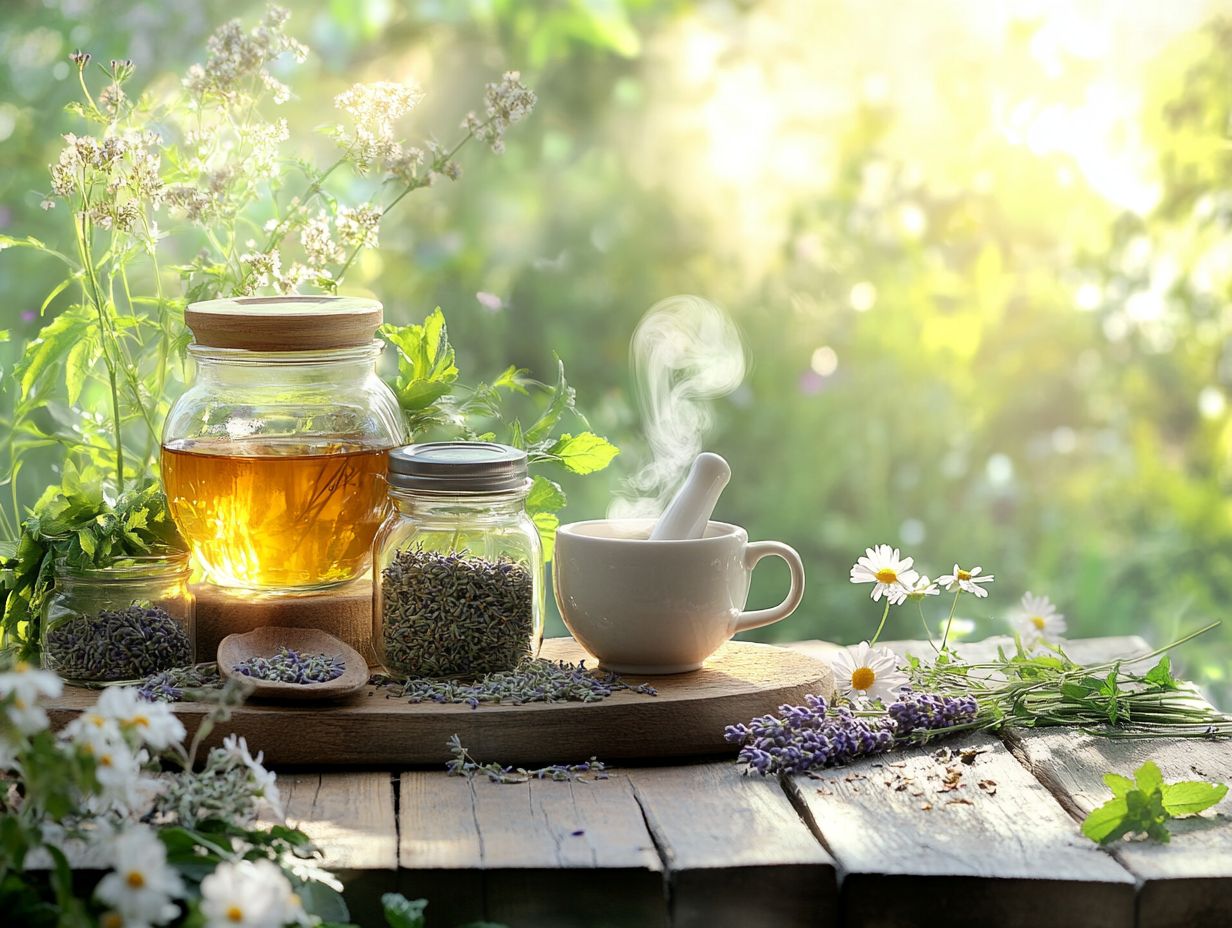
You have a wealth of herbal remedies at your disposal for stress relief, each offering its own unique properties and benefits. From the calming embrace of chamomile tea to the anxiety-reducing properties of passion flower and the adaptogenic prowess of ashwagandha, there s something for everyone.
Consider incorporating herbal teas like chamomile or green tea into your daily routine. These soothing brews not only promote relaxation but also create a comforting ritual. Simply steeping dried herbs in hot water allows their beneficial compounds to infuse, transforming your cup into a serene escape. For additional relief, you might explore DIY herbal remedies for common cold relief.
If you prefer a more concentrated option, herbal extracts such as valerian root tincture are an excellent choice. These tinctures can be easily mixed into water or taken directly, providing a potent dose that research suggests may effectively alleviate anxiety.
Don t overlook the power of essential oils, either. Lavender and bergamot can be inhaled or diffused, creating an inviting atmosphere for calming aromatherapy. Studies indicate that they may even help lower stress-related hormones.
Each of these approaches offers a distinctive way to tap into nature’s resources for enhancing your mental well-being.
Ready to explore these remedies for a stress-free life?
How Can One Incorporate Herbal Remedies into Their Daily Routine?
Incorporating herbal remedies into your daily routine can be both simple and rewarding. These methods can enhance your stress management efforts through soothing practices like infusing calming herbal teas, using essential oils, or taking dietary supplements that promote emotional well-being.
To maximize their effectiveness, consider timing your intake with moments that naturally invite relaxation, like winding down in the evening or enjoying a mid-afternoon break. Pair calming herbs like chamomile or lavender with mindfulness practices, such as deep breathing or journaling, and enhance your experience with herbal bath recipes for relaxation to amplify their soothing effects.
Try making a morning smoothie that includes adaptogenic herbs like ashwagandha, which helps your body adapt to stress, or rhodiola, providing a gentle energy boost throughout the day. Consistency is essential. Keeping a dedicated notebook to track your feelings and the effects of each herb can yield invaluable insights and deepen your connection to your wellness journey.
Are There Any Risks or Side Effects of Using Herbal Remedies for Stress Relief?
While herbal remedies can provide significant benefits for stress relief, it’s crucial to recognize the risks or side effects associated with their use. It’s important to focus on quality control to ensure you get the best benefits!
Take St. John’s Wort, for example; it’s commonly used for mild depression but can interact with prescription medications, potentially leading to dangerous reactions. Similarly, kava, known for its calming effects, has been associated with liver toxicity in some instances. Therefore, consult healthcare providers before starting any new treatment regimen. They can offer valuable insights into the safety of specific herbs tailored to your needs.
Implementing rigorous quality assurance practices is vital. This ensures that herbal products are free from contaminants and accurately labeled, safeguarding you and maximizing the therapeutic potential of these natural alternatives.
What Are Some Other Natural Ways to Manage Stress?
Along with herbal remedies, you have a wealth of natural options to manage stress effectively. Integrate physical activity, relaxation techniques, and cognitive behavioral therapy which helps change negative thought patterns into your routine. Together, these practices can significantly enhance your mental health and overall well-being.
Engaging in regular exercise, like walking, yoga, or dancing, works wonders. Not only does it release feel-good endorphins, but it also clears your mind. Pair this with journaling for a safe space to express your thoughts and emotions, allowing you to reflect on and process daily challenges.
Mindfulness practices, such as meditation and deep-breathing exercises, can sharpen your focus and cultivate a sense of calm. Make mindful dietary changes by incorporating nutrient-rich foods to further strengthen your resilience against stress.
By blending these strategies seamlessly, you can create a holistic approach to stress relief that harmonizes beautifully with herbal interventions, maximizing your effectiveness in achieving tranquility.
Frequently Asked Questions

What are the top 5 DIY herbal remedies for stress relief?
Yes, the top 5 DIY herbal remedies for stress relief include lavender, chamomile, ashwagandha, lemon balm, and valerian root.
How does lavender help with stress relief?
Yes, lavender is known for its calming properties and can help reduce anxiety, promote relaxation, and improve sleep quality.
Can chamomile really help with stress relief?
Yes, chamomile has been used for centuries to promote relaxation and reduce stress. It contains compounds that have a mild sedative effect and can also help improve sleep.
What is ashwagandha and how does it help with stress relief?
Ashwagandha is an adaptogenic herb that can help the body handle stress better. It can also improve mood, reduce anxiety, and promote relaxation.
How can lemon balm be used for stress relief?
Lemon balm can be used in tea or as an essential oil to help reduce stress, improve mood, and promote relaxation. It can also help improve sleep quality.
Is valerian root an effective DIY herbal remedy for stress relief?
Valerian root has been used for centuries to calm nerves. It promotes relaxation and can help improve sleep.
If you re looking for a natural way to unwind, valerian root might be just what you need!

